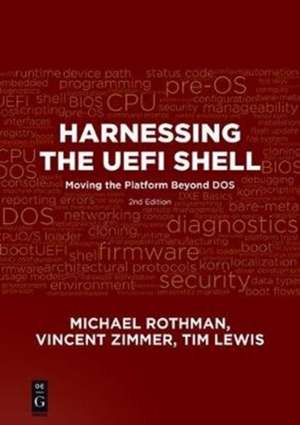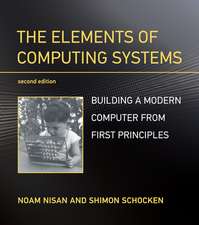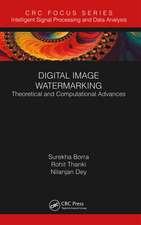Harnessing the UEFI Shell
Autor Michael Rothman, Tim Lewis, Vincent Zimmeren Limba Engleză Paperback – 6 mar 2017
Harnessing the UEFI Shell is authored by the three chairs of the UEFI working sub-teams, Michael Rothman (Intel, chair of the UEFI Configuration and UEFI Shell sub-teams), Vincent Zimmer (Intel, chair of the UEFI networking sub-team and security sub-team), and Tim Lewis (Insyde Software, chair of the UEFI security sub-team). This book is perfect for any OEMs that ship UEFI-based solutions (which is all of the MNCs such as IBM, Dell, HP, Apple, etc.), software developers who are focused on delivering solutions targeted to manufacturing, diagnostics, hobbyists, or stand-alone kiosk environments.
Preț: 526.77 lei
Preț vechi: 658.47 lei
-20% Nou
Puncte Express: 790
Preț estimativ în valută:
100.81€ • 104.86$ • 83.22£
100.81€ • 104.86$ • 83.22£
Carte disponibilă
Livrare economică 24 martie-07 aprilie
Preluare comenzi: 021 569.72.76
Specificații
ISBN-13: 9781501514807
ISBN-10: 1501514806
Pagini: 326
Ilustrații: 87 Schwarz-Weiß- Abbildungen
Dimensiuni: 170 x 240 x 18 mm
Greutate: 0.68 kg
Ediția:2nd edition
Editura: De Gruyter
ISBN-10: 1501514806
Pagini: 326
Ilustrații: 87 Schwarz-Weiß- Abbildungen
Dimensiuni: 170 x 240 x 18 mm
Greutate: 0.68 kg
Ediția:2nd edition
Editura: De Gruyter
Notă biografică
Michael Rothman (Intel, chair of the UEFI Configuration and UEFI Shell sub-teams), Vincent Zimmer (Intel, chair of the UEFI networking sub-team and security sub-team), and Tim Lewis (Insyde Software, chair of the UEFI security sub-team).
Cuprins
Preface ¿ vii
Chapter 1 Introduction ¿ 1
What is UEFI? ¿ 1
What Do We Mean by Shell? ¿ 4
A Short History of the UEFI Shell ¿ 5
Brief Overview of the UEFI Shell ¿ 5
UEFI Shell APIs ¿ 6
Command Line Interface Features ¿ 6
Why a Shell at all? ¿ 7
Chapter 2 Under the UEFI Shell ¿ 9
Shell and UEFI ¿ 9
Evolution and Revolution ¿ 13
Chapter 3 What Is the UEFI Shell? ¿ 15
What Is Contained in the UEFI Shell? ¿ 16
What Kind of Shell Do You Have? ¿ 16
What!? No Shell? No Problem! ¿ 17
Programmatic Shell Environment ¿ 19
Using UEFI Shell Commands ¿ 20
Interactive Shell Environment ¿ 22
Scripting ¿ 22
Program Launch ¿ 24
File-System Abstractions ¿ 29
Shell Script Resolves into a UEFI Firmware Action ¿ 31
Chapter 4 Why We Need an Execution Environment before the OS ¿ 33
Evolution of a Machine ¿ 33
The Platform Initialization Flow ¿ 34
UEFI Transitions ¿ 36
States of a Platform ¿ 38
Readiness of UEFI ¿ 41
Migration Using the UEFI Shell ¿ 44
Going Forward ¿ 45
Chapter 5 Manufacturing ¿ 47
Throughput ¿ 47
Manufacturing Test Tools ¿ 49
Hardware Access with Manufacturing Tools ¿ 50
Converting Manufacturing Tools ¿ 53
Conclusion ¿ 54
Chapter 6 Bare Metal Provisionig ¿ 55
Provisioning with the UEFI Shell ¿ 55
UEFI Networking Stack ¿ 56
Securing the Network ¿ 58
Speeding Up the Network ¿ 62
Example of Putting It Together ¿ 62
Summary ¿ 68
Chapter 7 Configuration of Provisioned Material ¿ 69
Initialization Timeline ¿ 69
Configuration Infrastructure Overview ¿ 71
Using the Configuration Infrastructure ¿ 72
Driver Model Interactions ¿ 73
Provisioning the Platform ¿ 75
Configuring through the UEFI Shell ¿ 76
Basic Configuration ¿ 76
Advanced Configuration Abilities ¿ 79
Chapter 8 The Use of UEFI for Diagnostics ¿ 85
Types of Diagnostics ¿ 85
SMBIOS Table Organization ¿ 87
SMBIOS Structure Table Entry Point ¿ 88
Table Organization Graph ¿ 88
Structure Standards ¿ 89
Structure Evolution and Usage Guidelines ¿ 90
Text Strings ¿ 90
Required Structures and Data ¿ 91
Features ¿ 91
User Interface Design ¿ 92
Design Guide ¿ 92
Usage ¿ 93
Examples ¿ 93
Architecture Design ¿ 94
Data Structure ¿ 95
SMBIOS_STRUCTURE_TABLE ¿ 95
SMBIOS_HEADER ¿ 97
SMBIOS_STRUCTURE_POINTER ¿ 98
STRUCTURE_STATISTICS ¿ 99
Source Code for the Utility ¿ 100
Summary ¿ 105
Chapter 9 UEFI Shell Scripting ¿ 107
Hello, World! ¿ 108
Echo ¿ 108
Echo All Parameters ¿ 109
Echo All Parameters (Improved Version) ¿ 110
Concatenate Text Files ¿ 112
List Only Selected "ls" Information ¿ 113
Install Script ¿ 115
How to Make a Shell Script Appear as a Boot Option ¿ 119
Chapter 10 UEFI Shell Programming ¿ 121
A Simple UEFI Shell Application: HelloWorld ¿ 121
The Source File: HelloWorld.c ¿ 121
The Component Information (.inf) File ¿ 123
A Simple Standard Application: HelloWorld2 ¿ 124
The Source File: HelloWorld2.c ¿ 124
The Component Information (.inf) File: HelloWorld2.inf ¿ 125
Read Keyboard Input in UEFI Shell Scripts: GetKey ¿ 126
The Source File: GetKey.c ¿ 127
The Component Information (.inf) File: GetKey.inf ¿ 137
The Build Description (.dsc) File ¿ 139
Calculate Math Expressions: Math ¿ 139
The Source File: Math.c ¿ 140
The Component Information (.inf) File: Math.inf ¿ 154
Convert ASCII to Unicode and Back: UniCodeDecode ¿ 154
The Source File: UniCodeDecode.c ¿ 155
The Component Information (.inf) File ¿ 163
Chapter 11 Managing UEFI Drivers Using the Shell ¿ 165
Testing Specific Protocols ¿ 166
Loading and Unloading UEFI Drivers ¿ 167
Load ¿ 168
LoadPciRom ¿ 168
Unload ¿ 169
Connecting UEFI Drivers ¿ 169
Connect ¿ 169
Disconnect ¿ 170
Reconnect ¿ 170
Driver and Device Information ¿ 171
Drivers ¿ 171
Devices ¿ 172
DevTree ¿ 172
Dh -d ¿ 173
OpenInfo ¿ 173
Testing the Driver Configuration and Driver Diagnostics Protocols ¿ 174
DrvCfg ¿ 174
DrvDiag ¿ 174
Debugging Code Statements ¿ 175
POST Codes ¿ 177
Post Card Debug ¿ 178
Text-Mode VGA Frame Buffer ¿ 179
Other Options ¿ 179
Appendix A Security Considerations ¿ 181
UEFI Shell Binary Integrity ¿ 181
Overview ¿ 181
Signed Executable Overview ¿ 182
Digital Signature ¿ 183
Signed Executable Processing ¿ 185
Signed Executable Generation Application (SignTool) ¿ 185
UEFI Load Image ¿ 186
SignTool ¿ 186
Build Environment ¿ 186
Example usage ¿ 187
Appendix B Command Reference ¿ 189
Command Profiles and Support Levels ¿ 189
Command List ¿ 189
Standardizing Command Output ¿ 192
Command Details ¿ 193
alias ¿ 193
attrib ¿ 194
bcfg ¿ 194
cd ¿ 196
cls ¿ 197
comp ¿ 197
connect ¿ 198
cp/copy ¿ 199
date ¿ 199
dblk ¿ 200
del ¿ 200
devices ¿ 200
devtree ¿ 201
dh ¿ 201
dir/ls ¿ 202
disconnect ¿ 202
dmem ¿ 203
dmpstore ¿ 204
drivers ¿ 204
drvcfg ¿ 205
drvdiag ¿ 206
echo ¿ 206
edit ¿ 207
eficompress ¿ 207
efidecompress ¿ 207
exit ¿ 207
for ¿ 208
getmtc ¿ 209
goto ¿ 209
help ¿ 209
hexedit ¿ 210
if ¿ 210
ifconfig ¿ 214
ifconfig6 ¿ 214
load ¿ 215
loadpcirom ¿ 216
ls ¿ 216
map ¿ 217
md ¿ 218
mem ¿ 218
memmap ¿ 218
mkdir ¿ 219
mm ¿ 219
mode ¿ 220
mv ¿ 220
openinfo ¿ 220
parse ¿ 221
pause ¿ 221
pci ¿ 221
ping ¿ 222
ping6 ¿ 222
reconnect ¿ 223
reset ¿ 223
rm ¿ 224
sermode ¿ 224
set ¿ 225
setsize ¿ 226
setvar ¿ 226
shift ¿ 227
smbiosview ¿ 227
stall ¿ 228
time ¿ 228
time ¿ 229
touch ¿ 229
type ¿ 230
unload ¿ 230
ver ¿ 230
vol ¿ 230
Appendix C Programming Reference ¿ 233
Script-based Programming ¿ 233
Parameter Passing ¿ 233
Redirection and Piping ¿ 234
Return Codes ¿ 235
Environment Variables ¿ 236
Non-Script-based Programming ¿ 237
Shell Protocol ¿ 238
Shell Parameters Protocol ¿ 240
Appendix D UEFI Shell Library ¿ 241
Functions ¿ 241
File I/O Functions ¿ 241
Miscellaneous Functions ¿ 242
Command Line Parsing ¿ 243
Text I/O ¿ 244
String Functions ¿ 244
ShellCloseFile() ¿ 245
ShellCloseFileMetaArg() ¿ 246
ShellCommandLineCheckDuplicate() ¿ 246
ShellCommandLineFreeVarList() ¿ 247
ShellCommandLineGetCount() ¿ 247
ShellCommandLineGetFlag() ¿ 248
ShellCommandLineGetValue() ¿ 248
ShellCommandLineGetRawValue() ¿ 249
ShellCommandLineParseEx() ¿ 250
ShellCopySearchAndReplace() ¿ 251
ShellConvertStringToUint64() ¿ 252
ShellCreateDirectory() ¿ 253
ShellDeleteFile() ¿ 254
ShellDeleteFileByName() ¿ 254
ShellExecute() ¿ 255
ShellFileExists() ¿ 257
ShellFileHandleReturnLine() ¿ 257
ShellFileHandleReadLine() ¿ 258
ShellFindFilePath() ¿ 259
ShellFindFilePathEx() ¿ 260
ShellFindFirstFile() ¿ 260
ShellFindNextFile() ¿ 261
ShellFlushFile() ¿ 262
SHELL_FREE_NON_NULL() ¿ 263
ShellGetCurrentDir() ¿ 263
ShellGetEnvironmentVariable() ¿ 264
ShellGetExecutionBreakFlag() ¿ 265
ShellGetFileInfo() ¿ 265
ShellGetFilePosition() ¿ 266
ShellGetFileSize() ¿ 266
ShellHexStrToUintn() ¿ 267
ShellInitialize() ¿ 268
ShellIsDecimalDigitCharacter() ¿ 268
ShellIsDirectory() ¿ 269
ShellIsFile() ¿ 269
ShellIsFileInPath() ¿ 270
ShellIsHexaDecimalDigitCharacter() ¿ 270
ShellIsHexOrDecimalNumber() ¿ 271
ShellOpenFileByDevicePath() ¿ 271
ShellOpenFileByName() ¿ 273
ShellOpenFileMetaArg() ¿ 274
ShellPrintEx() ¿ 275
ShellPrintHelp() ¿ 276
ShellPrintHiiEx() ¿ 277
ShellPromptForResponse() ¿ 278
ShellPromptForResponseHii() ¿ 279
ShellReadFile() ¿ 281
ShellSetFileInfo() ¿ 282
ShellSetFilePosition() ¿ 283
ShellSetEnvironmentVariable() ¿ 284
ShellSetPageBreakMode() ¿ 285
ShellStrToUintn() ¿ 285
ShellWriteFile() ¿ 286
StrnCatGrow() ¿ 287
Data Structures ¿ 288
Format Strings ¿ 288
Shell Parameters ¿ 289
Index ¿ 291
Chapter 1 Introduction ¿ 1
What is UEFI? ¿ 1
What Do We Mean by Shell? ¿ 4
A Short History of the UEFI Shell ¿ 5
Brief Overview of the UEFI Shell ¿ 5
UEFI Shell APIs ¿ 6
Command Line Interface Features ¿ 6
Why a Shell at all? ¿ 7
Chapter 2 Under the UEFI Shell ¿ 9
Shell and UEFI ¿ 9
Evolution and Revolution ¿ 13
Chapter 3 What Is the UEFI Shell? ¿ 15
What Is Contained in the UEFI Shell? ¿ 16
What Kind of Shell Do You Have? ¿ 16
What!? No Shell? No Problem! ¿ 17
Programmatic Shell Environment ¿ 19
Using UEFI Shell Commands ¿ 20
Interactive Shell Environment ¿ 22
Scripting ¿ 22
Program Launch ¿ 24
File-System Abstractions ¿ 29
Shell Script Resolves into a UEFI Firmware Action ¿ 31
Chapter 4 Why We Need an Execution Environment before the OS ¿ 33
Evolution of a Machine ¿ 33
The Platform Initialization Flow ¿ 34
UEFI Transitions ¿ 36
States of a Platform ¿ 38
Readiness of UEFI ¿ 41
Migration Using the UEFI Shell ¿ 44
Going Forward ¿ 45
Chapter 5 Manufacturing ¿ 47
Throughput ¿ 47
Manufacturing Test Tools ¿ 49
Hardware Access with Manufacturing Tools ¿ 50
Converting Manufacturing Tools ¿ 53
Conclusion ¿ 54
Chapter 6 Bare Metal Provisionig ¿ 55
Provisioning with the UEFI Shell ¿ 55
UEFI Networking Stack ¿ 56
Securing the Network ¿ 58
Speeding Up the Network ¿ 62
Example of Putting It Together ¿ 62
Summary ¿ 68
Chapter 7 Configuration of Provisioned Material ¿ 69
Initialization Timeline ¿ 69
Configuration Infrastructure Overview ¿ 71
Using the Configuration Infrastructure ¿ 72
Driver Model Interactions ¿ 73
Provisioning the Platform ¿ 75
Configuring through the UEFI Shell ¿ 76
Basic Configuration ¿ 76
Advanced Configuration Abilities ¿ 79
Chapter 8 The Use of UEFI for Diagnostics ¿ 85
Types of Diagnostics ¿ 85
SMBIOS Table Organization ¿ 87
SMBIOS Structure Table Entry Point ¿ 88
Table Organization Graph ¿ 88
Structure Standards ¿ 89
Structure Evolution and Usage Guidelines ¿ 90
Text Strings ¿ 90
Required Structures and Data ¿ 91
Features ¿ 91
User Interface Design ¿ 92
Design Guide ¿ 92
Usage ¿ 93
Examples ¿ 93
Architecture Design ¿ 94
Data Structure ¿ 95
SMBIOS_STRUCTURE_TABLE ¿ 95
SMBIOS_HEADER ¿ 97
SMBIOS_STRUCTURE_POINTER ¿ 98
STRUCTURE_STATISTICS ¿ 99
Source Code for the Utility ¿ 100
Summary ¿ 105
Chapter 9 UEFI Shell Scripting ¿ 107
Hello, World! ¿ 108
Echo ¿ 108
Echo All Parameters ¿ 109
Echo All Parameters (Improved Version) ¿ 110
Concatenate Text Files ¿ 112
List Only Selected "ls" Information ¿ 113
Install Script ¿ 115
How to Make a Shell Script Appear as a Boot Option ¿ 119
Chapter 10 UEFI Shell Programming ¿ 121
A Simple UEFI Shell Application: HelloWorld ¿ 121
The Source File: HelloWorld.c ¿ 121
The Component Information (.inf) File ¿ 123
A Simple Standard Application: HelloWorld2 ¿ 124
The Source File: HelloWorld2.c ¿ 124
The Component Information (.inf) File: HelloWorld2.inf ¿ 125
Read Keyboard Input in UEFI Shell Scripts: GetKey ¿ 126
The Source File: GetKey.c ¿ 127
The Component Information (.inf) File: GetKey.inf ¿ 137
The Build Description (.dsc) File ¿ 139
Calculate Math Expressions: Math ¿ 139
The Source File: Math.c ¿ 140
The Component Information (.inf) File: Math.inf ¿ 154
Convert ASCII to Unicode and Back: UniCodeDecode ¿ 154
The Source File: UniCodeDecode.c ¿ 155
The Component Information (.inf) File ¿ 163
Chapter 11 Managing UEFI Drivers Using the Shell ¿ 165
Testing Specific Protocols ¿ 166
Loading and Unloading UEFI Drivers ¿ 167
Load ¿ 168
LoadPciRom ¿ 168
Unload ¿ 169
Connecting UEFI Drivers ¿ 169
Connect ¿ 169
Disconnect ¿ 170
Reconnect ¿ 170
Driver and Device Information ¿ 171
Drivers ¿ 171
Devices ¿ 172
DevTree ¿ 172
Dh -d ¿ 173
OpenInfo ¿ 173
Testing the Driver Configuration and Driver Diagnostics Protocols ¿ 174
DrvCfg ¿ 174
DrvDiag ¿ 174
Debugging Code Statements ¿ 175
POST Codes ¿ 177
Post Card Debug ¿ 178
Text-Mode VGA Frame Buffer ¿ 179
Other Options ¿ 179
Appendix A Security Considerations ¿ 181
UEFI Shell Binary Integrity ¿ 181
Overview ¿ 181
Signed Executable Overview ¿ 182
Digital Signature ¿ 183
Signed Executable Processing ¿ 185
Signed Executable Generation Application (SignTool) ¿ 185
UEFI Load Image ¿ 186
SignTool ¿ 186
Build Environment ¿ 186
Example usage ¿ 187
Appendix B Command Reference ¿ 189
Command Profiles and Support Levels ¿ 189
Command List ¿ 189
Standardizing Command Output ¿ 192
Command Details ¿ 193
alias ¿ 193
attrib ¿ 194
bcfg ¿ 194
cd ¿ 196
cls ¿ 197
comp ¿ 197
connect ¿ 198
cp/copy ¿ 199
date ¿ 199
dblk ¿ 200
del ¿ 200
devices ¿ 200
devtree ¿ 201
dh ¿ 201
dir/ls ¿ 202
disconnect ¿ 202
dmem ¿ 203
dmpstore ¿ 204
drivers ¿ 204
drvcfg ¿ 205
drvdiag ¿ 206
echo ¿ 206
edit ¿ 207
eficompress ¿ 207
efidecompress ¿ 207
exit ¿ 207
for ¿ 208
getmtc ¿ 209
goto ¿ 209
help ¿ 209
hexedit ¿ 210
if ¿ 210
ifconfig ¿ 214
ifconfig6 ¿ 214
load ¿ 215
loadpcirom ¿ 216
ls ¿ 216
map ¿ 217
md ¿ 218
mem ¿ 218
memmap ¿ 218
mkdir ¿ 219
mm ¿ 219
mode ¿ 220
mv ¿ 220
openinfo ¿ 220
parse ¿ 221
pause ¿ 221
pci ¿ 221
ping ¿ 222
ping6 ¿ 222
reconnect ¿ 223
reset ¿ 223
rm ¿ 224
sermode ¿ 224
set ¿ 225
setsize ¿ 226
setvar ¿ 226
shift ¿ 227
smbiosview ¿ 227
stall ¿ 228
time ¿ 228
time ¿ 229
touch ¿ 229
type ¿ 230
unload ¿ 230
ver ¿ 230
vol ¿ 230
Appendix C Programming Reference ¿ 233
Script-based Programming ¿ 233
Parameter Passing ¿ 233
Redirection and Piping ¿ 234
Return Codes ¿ 235
Environment Variables ¿ 236
Non-Script-based Programming ¿ 237
Shell Protocol ¿ 238
Shell Parameters Protocol ¿ 240
Appendix D UEFI Shell Library ¿ 241
Functions ¿ 241
File I/O Functions ¿ 241
Miscellaneous Functions ¿ 242
Command Line Parsing ¿ 243
Text I/O ¿ 244
String Functions ¿ 244
ShellCloseFile() ¿ 245
ShellCloseFileMetaArg() ¿ 246
ShellCommandLineCheckDuplicate() ¿ 246
ShellCommandLineFreeVarList() ¿ 247
ShellCommandLineGetCount() ¿ 247
ShellCommandLineGetFlag() ¿ 248
ShellCommandLineGetValue() ¿ 248
ShellCommandLineGetRawValue() ¿ 249
ShellCommandLineParseEx() ¿ 250
ShellCopySearchAndReplace() ¿ 251
ShellConvertStringToUint64() ¿ 252
ShellCreateDirectory() ¿ 253
ShellDeleteFile() ¿ 254
ShellDeleteFileByName() ¿ 254
ShellExecute() ¿ 255
ShellFileExists() ¿ 257
ShellFileHandleReturnLine() ¿ 257
ShellFileHandleReadLine() ¿ 258
ShellFindFilePath() ¿ 259
ShellFindFilePathEx() ¿ 260
ShellFindFirstFile() ¿ 260
ShellFindNextFile() ¿ 261
ShellFlushFile() ¿ 262
SHELL_FREE_NON_NULL() ¿ 263
ShellGetCurrentDir() ¿ 263
ShellGetEnvironmentVariable() ¿ 264
ShellGetExecutionBreakFlag() ¿ 265
ShellGetFileInfo() ¿ 265
ShellGetFilePosition() ¿ 266
ShellGetFileSize() ¿ 266
ShellHexStrToUintn() ¿ 267
ShellInitialize() ¿ 268
ShellIsDecimalDigitCharacter() ¿ 268
ShellIsDirectory() ¿ 269
ShellIsFile() ¿ 269
ShellIsFileInPath() ¿ 270
ShellIsHexaDecimalDigitCharacter() ¿ 270
ShellIsHexOrDecimalNumber() ¿ 271
ShellOpenFileByDevicePath() ¿ 271
ShellOpenFileByName() ¿ 273
ShellOpenFileMetaArg() ¿ 274
ShellPrintEx() ¿ 275
ShellPrintHelp() ¿ 276
ShellPrintHiiEx() ¿ 277
ShellPromptForResponse() ¿ 278
ShellPromptForResponseHii() ¿ 279
ShellReadFile() ¿ 281
ShellSetFileInfo() ¿ 282
ShellSetFilePosition() ¿ 283
ShellSetEnvironmentVariable() ¿ 284
ShellSetPageBreakMode() ¿ 285
ShellStrToUintn() ¿ 285
ShellWriteFile() ¿ 286
StrnCatGrow() ¿ 287
Data Structures ¿ 288
Format Strings ¿ 288
Shell Parameters ¿ 289
Index ¿ 291
Descriere
Focusing on the UEFI Shell and its recently released formal specification, this book unlocks numerous usage models, which help users fully utilize Shell solutions. This text expands on Shell utilization, and demonstrates how the Shell can be used in























